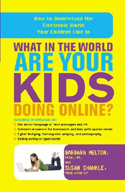Book
What in the World Are Your Kids Doing Online?
In 2007, I teamed up with a colleague of mine, Susan Shankle, to co-author a book about children, the online world and what we began to see as a growing problem in our communities. The book is intended to educate parents and helping professionals as to the risk factors associated with our children interacting in an ever-expanding online world.
Reviews
Publishers Weekly
“Educators Melton and Shankle offer a reasonable, nonalarmist guide for concerned parents in helping their kids navigate the wonders and perils of the cyberworld. The authors downplay the dangers of Internet predators (the statistics are actually low), while they emphasize the importance of establishing a healthy balance of virtual and real-time activities for growing kids. Cellphones, instant text messaging, online surfing (Web sites, chat rooms, blogs) and dating aren’t going to go away, and the authors give a crash course in what children are bombarded with daily, in school and elsewhere. Establishing an honor system with kids is crucial: Keep the lines of communication open is an often repeated dictum. The authors consider the cyberworld from the perspectives of both kids (establishing e-mail etiquette and coping with bullying, for example) and adults (inserting filters and monitors), but most helpful is the section on how intensive engagement with the cyberworld affects a child’s development, from early youth to the teen years. The authors do sing the benefits of using the Internet for research and global communication, especially for special-needs kids; however, they convincingly stress moderation and firm parental involvement. (Aug.) Copyright © Reed Business Information, a division of Reed Elsevier Inc. All rights reserved.”
Booklist
“Forget what you think you know about online communications. According to Melton (a counselor) and Shankle (a social worker), even older teens aren’t as technologically savvy as their middle-school siblings. What, then, are parents to do to ensure that their Web-wise children are safe in cyberspace? Serious threats abound, including cyberbullying and child predators, and although Melton and Shankle don’t sugarcoat the dangers, they also believe that it is realistic to allow children limited access to the Internet’s riches. Much of their advice is rooted in traditional parenting principles—setting limits, allowing for a measure of trust, ensuring a balanced lifestyle—but Web-specific concerns such as filtering and spying software are also covered. Thankfully, the authors leave room for discretion, realizing that not every parent will opt to use safety software. Even those opposed to such clandestine methods of control will benefit from the authors’ overview of how the software works and how it can be adapted to individual needs. A fine manual for parents of children approaching, in the middle of, or even toward the end of their teens. Wilkens, Mary Frances”

